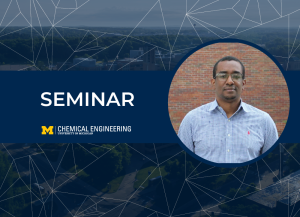Presented By: Chemical Engineering
ChE Seminar: "Redefining, repurposing, and reprogramming post-translational modification enzymes"
Carl Denard University of Florida

The ChE seminar series features guest speakers. U-M ChE faculty and graduate students are especially encouraged to attend.
ABSTRACT:
The ability to introduce a chemo- and regioselective post-translational modification (PTM) into a protein is foundational to our understanding of health and disease and is at the center of most chemical biology, synthetic biology, biotechnological and biomedical advances. The Denard Lab aims to redefine, repurpose, and reprogram enzymes that catalyze PTMs (PTM-enzymes), with a focus on proteases and protein ligases. We think of reprogramming a PTM-enzyme in three ways: through protein engineering to modify its biochemical properties, by functional interactions with a selective ligand, through substrate engineering and profiling. To achieve these goals, we have developed several high-throughput functional screens.
In this talk, I will first present our current results on engineering the specificity of a human protease towards new targets, using a high throughput directed evolution platform called YESS 2.0. Our long-term goal is to engineer proteases capable of degrading aggregated proteins. Such engineered enzymes could serve as modalities to investigate and treat protein aggregation diseases (synucleopathies, transthyretin amyloidosis). In early results, we have isolated neurosin variants with switched specificity capable of cleaving peptide substrates found in alpha-synuclein. These variants exhibit reduced activity towards a consensus sequence found in protease activatable receptors. Second, I will share our recent advancements in developing a high-throughput platform to discover protein-based modulators that can reprogram a PTM-enzyme. Our platform is designed to isolate protein-based binders, including nanobodies, antibodies, ScFvs, that can inhibit, activate, or change the substrate specificity of an enzyme. Our results have established this platform as a high-throughput discovery for protease inhibitory nanobodies. Lastly, we developed a platform to comprehensively profile the substrate specificity of sortases. Using Streptococcus pyogenes sortase A as a model, we show that extending the sortase substrate beyond the P1’ residue enhances sortase-mediated ligation kinetics. Most importantly, this comprehensive profiling reveals several non-canonical sortase substrates, some of which exhibit higher ligation kinetics compared to known sortase substrates.
BIO:
Dr. Denard received his B.S. degree in Chemical Engineering from North Carolina State University. He then moved to the Chemical and Biomolecular Engineering department at the University of Illinois at Urbana-Champaign, where he obtained his PhD under the tutelage of Prof. Huimin Zhao. As a Dow Chemical fellow, his PhD thesis centered on developing cooperative one-pot chemoenzymatic reactions. Dr. Denard later completed a postdoctoral fellowship in the lab of Prof. Brent Iverson at the University of Texas at Austin establishing high-throughput platforms for engineering the substrate specificity of proteases to enable their use as protein therapeutics. Dr. Denard joined the University of Florida Chemical Engineering department as an Assistant Professor in January 2022. His research focuses on protein engineering for therapeutic and synthetic biology applications, with a focus on reprogramming PTM-enzymes. For these ongoing efforts, the Denard lab received the NIH MIRA award in September 2022
ABSTRACT:
The ability to introduce a chemo- and regioselective post-translational modification (PTM) into a protein is foundational to our understanding of health and disease and is at the center of most chemical biology, synthetic biology, biotechnological and biomedical advances. The Denard Lab aims to redefine, repurpose, and reprogram enzymes that catalyze PTMs (PTM-enzymes), with a focus on proteases and protein ligases. We think of reprogramming a PTM-enzyme in three ways: through protein engineering to modify its biochemical properties, by functional interactions with a selective ligand, through substrate engineering and profiling. To achieve these goals, we have developed several high-throughput functional screens.
In this talk, I will first present our current results on engineering the specificity of a human protease towards new targets, using a high throughput directed evolution platform called YESS 2.0. Our long-term goal is to engineer proteases capable of degrading aggregated proteins. Such engineered enzymes could serve as modalities to investigate and treat protein aggregation diseases (synucleopathies, transthyretin amyloidosis). In early results, we have isolated neurosin variants with switched specificity capable of cleaving peptide substrates found in alpha-synuclein. These variants exhibit reduced activity towards a consensus sequence found in protease activatable receptors. Second, I will share our recent advancements in developing a high-throughput platform to discover protein-based modulators that can reprogram a PTM-enzyme. Our platform is designed to isolate protein-based binders, including nanobodies, antibodies, ScFvs, that can inhibit, activate, or change the substrate specificity of an enzyme. Our results have established this platform as a high-throughput discovery for protease inhibitory nanobodies. Lastly, we developed a platform to comprehensively profile the substrate specificity of sortases. Using Streptococcus pyogenes sortase A as a model, we show that extending the sortase substrate beyond the P1’ residue enhances sortase-mediated ligation kinetics. Most importantly, this comprehensive profiling reveals several non-canonical sortase substrates, some of which exhibit higher ligation kinetics compared to known sortase substrates.
BIO:
Dr. Denard received his B.S. degree in Chemical Engineering from North Carolina State University. He then moved to the Chemical and Biomolecular Engineering department at the University of Illinois at Urbana-Champaign, where he obtained his PhD under the tutelage of Prof. Huimin Zhao. As a Dow Chemical fellow, his PhD thesis centered on developing cooperative one-pot chemoenzymatic reactions. Dr. Denard later completed a postdoctoral fellowship in the lab of Prof. Brent Iverson at the University of Texas at Austin establishing high-throughput platforms for engineering the substrate specificity of proteases to enable their use as protein therapeutics. Dr. Denard joined the University of Florida Chemical Engineering department as an Assistant Professor in January 2022. His research focuses on protein engineering for therapeutic and synthetic biology applications, with a focus on reprogramming PTM-enzymes. For these ongoing efforts, the Denard lab received the NIH MIRA award in September 2022